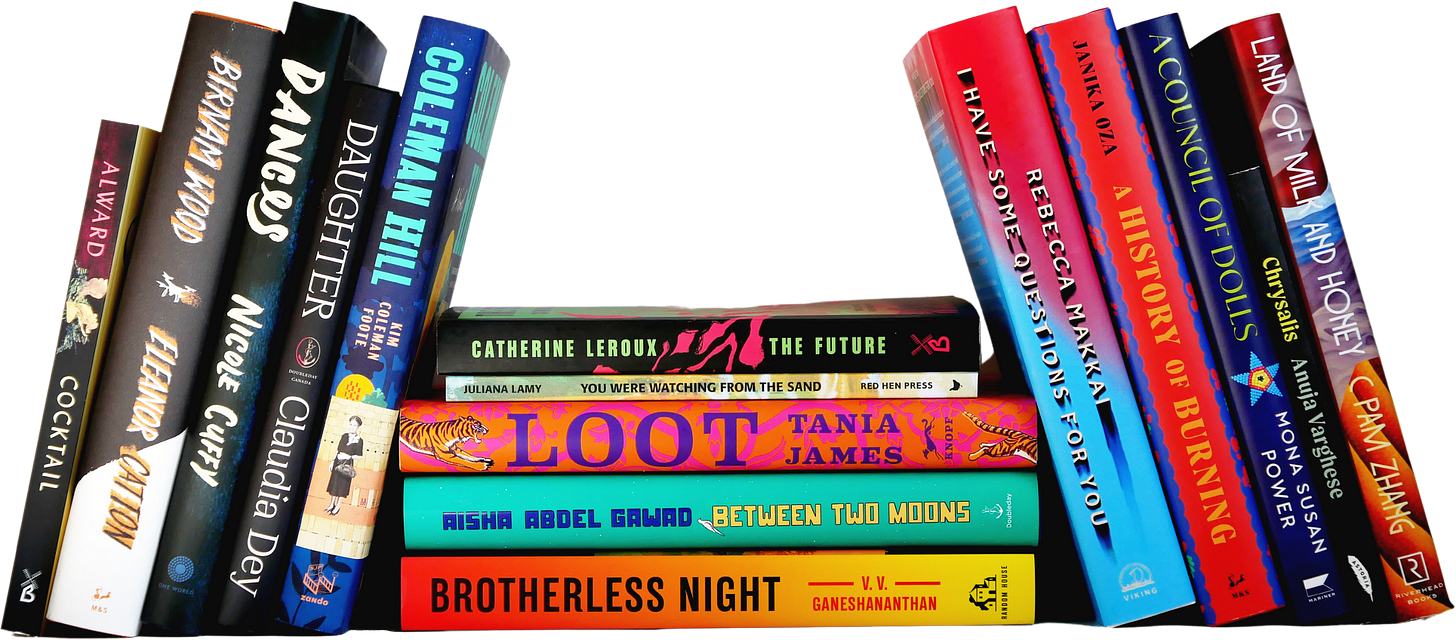15 Books By Women You Should Read
Or, my wondrous year judging the $150K Carol Shields Prize for Fiction
In the world of books, writers are often called upon to be good citizens of our community. Sometimes that could mean writing a letter of recommendation for a fellow writer. It could mean reading a friend’s draft manuscript. It could mean reading submissions for a grant. It can also mean judging an award. I don’t think I’ve ever had such a phenomenal experience reading for an award as I have for this year’s Carol Shields Prize for Fiction. These submissions were outstanding, y’all. Outstanding!
First, let me say that this new prize (only in its 2nd year!) stands out among the rest because of the size of the award money. The winner is awarded $150,000 and each of the four finalists is awarded $12,500. For some context, the Pulitzer Prize for Fiction awards $15,000 to the winner. The National Book Award winner receives $10,000 and each finalist receives $1,000. And the PEN/Faulkner Award for Fiction winner receives $15,000 and each finalist receives $1,000. And here is something I didn’t know until I began writing this post (thanks to my talented writer friend Marie Myung-Ok Lee who is on the Board for clarifying): the National Book Critics Circle winner receives zero. It is a very prestigious award, but they have a tiny budget.
Internationally, prize money can be a bit higher for the major awards. The International Booker Prize awards £50,000 to the winner and£2,500 to the finalists. The Women’s Prize awards £30,000.
So you can see that a $150,000 bag is no small potatoes.
Let’s be clear. I am not one of those people who believes the size of the purse doesn’t matter and that writers only do this for the stature and honor. Yes, these awards are prestigious and can change careers. Any recognition by one’s peers is always a transformative experience, and I am not immune to the allure of just saying Pulitzer Prize. (The words roll off the tongue like butter…)
But prize money does matter to writers. Quite often, the time we put into writing books does not fare well in the “hourly wage labor” equation. And not only does it take a long time to write a book, it cost moolah—think of the research trips and supplies and childcare (yup, I said it. Childcare needs to be a factor in the equation).
You can’t eat a trophy. Nor can you print out pages on it.
It is for these reasons and more that I’m excited about the Carol Shields Prize for Fiction which is named after a Canadian writer who published more than twenty books. Here is what I learned judging the prize (along with my rock star fellow jury panel: Laila Lalami, Claire Messud, Jen Sookfong Lee, and Eden Robinson): the state of women’s fiction is excellent. There are some Canadian and American women out here tearing it up. And our storytelling is diverse! From short story collections to graphic novels to works in translation to novels, women writers are changing the game.
Today, I’m going to share with you the 15 extraordinary novels that made our longlist. These were the primary criteria for submission:
All of the books must be published in 2023.
The prize was open to novels, short story collections, and graphic novels written for an adult audience.
The authors must self-identify as women or non-binary. The prize recognizes transgender women as women without qualification.
Self-published books are not eligible. The publisher must be U.S. or Canadian based.
Books must be written by a single author.
Literary excellence.
And here they are:
Cocktail by Lisa Alward
"A writer to watch."—Kirkus Reviews (starred review)
Birnam Wood by Eleanor Catton
“A sophisticated page turner.” —New York Times
Dances by Nicole Cuffy
“The closest thing most of us will ever experience to actually dancing the ballet and to life in a dancer’s body.” — Kirkus Reviews (starred review)
Daughter by Claudia Dey
“A darkly glittering tale…Beautiful and piercing.” —New York Times
Coleman Hill by Kim Coleman Foote
“Gripping, poetic, and with a big heart, it’s a memorable work of grim determination and surprising optimism.” ―Publishers Weekly (starred review)
Brotherless Night by V.V. Ganeshananthan
“Ganeshananthan is a writer of remarkable restraint.”—New York Times
Between Two Moons by Aisha Abdel Gawad
"Breathtaking.” —New York Times
Loot by Tania James
“Addictively absorbing.” —New York Times
You Were Watching From the Sand by Juliana Lamy
“Juliana Lamy writes with a distinctly elegant voice and a potent charisma, so that story after burning story wedges itself into the reader’s heart.” —Independent Book Review
The Future by Catherine Leroux
“This atmospheric novel elevates disparate voices, drawing a complex picture of community-focused life beyond the family unit.”
—Kirkus Reviews (starred review)
I Have Some Questions For You by Rebecca Makkai
“[An] irresistible literary page-turner.” —The Boston Globe
A History of Burning by Janika Oza
“Remarkable….a haunting, symphonic tale”— New York Times
A Council of Dolls by Mona Susan Power
“Captivating…a healing vision that goes to the core of our humanity.” — New York Times
Chrysalis by Anuja Varghese
“Fantastical, surreal, complex, and often quite sensual…A powerful punch of stories.” —Miramichi Reader
Land of Milk and Honey by C. Pam Zhang
“The most breathtakingly beautiful dystopian novel since Station Eleven.” —Los Angeles Times
I hope y’all enjoy these books as much as I did. You can purchase them in my Bookshop store. If you’ve already read and enjoyed one of them, let us know in the comments!









What a great post, Dolen. Thank you. 🙏🏽